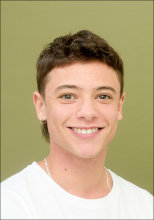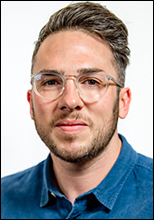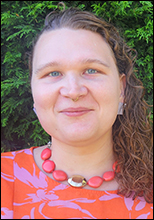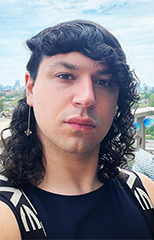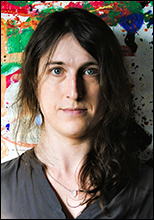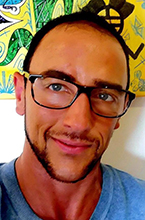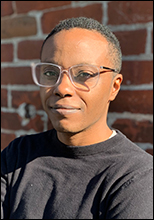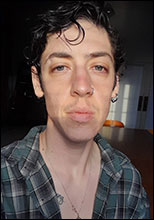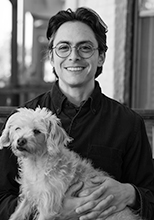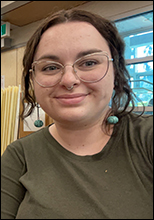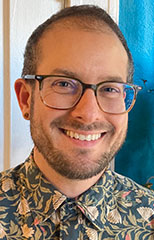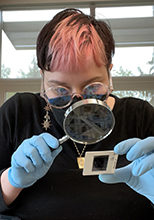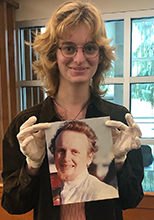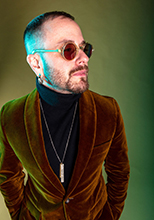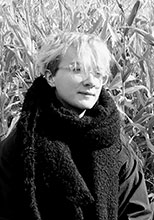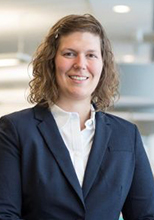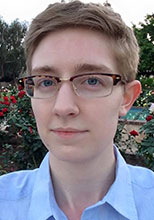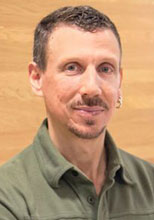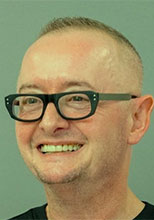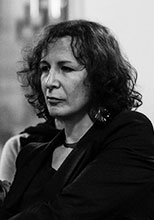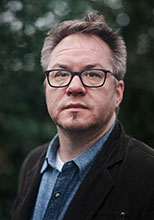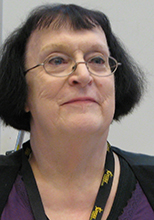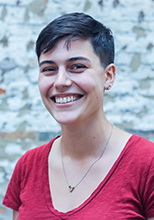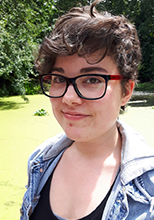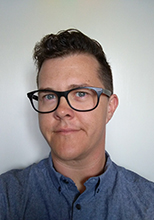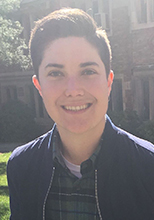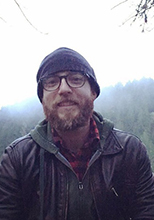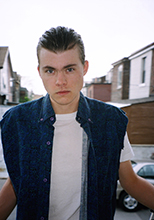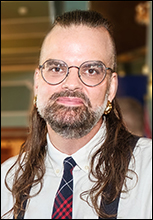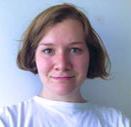Archives visitors
Esther Lamberts
Visited: October 2025
Esther is engaged in a PhD project on "Transnational Trans Histories: Networks of Healthcare Provision in a New Perspective (U.S., Canada, Belgium; 1960–2000)". This research examines transnational connections in trans healthcare history, focusing on networks surrounding three plastic surgeons that facilitated access to medical care across borders: Dr. Menard, Dr. Biber and Dr. Seghers. By looking at how individuals, knowledge, and practices travelled across borders, Esther aims to shed new light on the historical development of trans healthcare.
Their research interests include trans history, gender studies, and cultural history, with a particular focus on the intersections of healthcare, identity, agency, and international travel and circulation.
"The Transgender Archives encompasses a wide range of source types, from periodicals and letters to tapes and videos. It was a pleasure to handle the material firsthand. The discovery tool allowed for targeted searches across the many journals and newsletters. The archive’s commitment to making materials digitally searchable as well as accessible is noteworthy. It is an indispensable resource for researchers interested in the trans past. The archivists, staff and Aaron Devor were very helpful and provided much-appreciated guidance.”
Elio Colavito
Visited: September 2025
Elio Colavito (he/they) is a trans settler, interdisciplinary scholar, and PhD candidate in the Department of History with a collaborative specialization in Sexual Diversity Studies at the University of Toronto. He is an oral historian, digital humanist, and public historian whose passion lies in making a usable past accessible to trans communities. His research centers transmasculine histories of information activism and community formation in Canada and the United States from the 1970s to the 1990s.
"There's nothing like interacting with physical objects of the past, touching the artifacts of history that evidence trans life and resilience. My 'finds' at the Trans Archives delivered several goosebump-worthy moments that enriched both my scholarly and emotional worlds, all made possible by the archives' flexible and attentive staff.”
Hil Malatino
Visited: June 2025
Hil Malatino is an associate professor in the Department of Women’s, Gender, and Sexuality Studies, a senior research associate in the Rock Ethics Institute, and affiliate faculty in the Department of Philosophy. He holds a Ph.D. in philosophy and a graduate certificate in feminist theory from Binghamton University. Prior to coming to Penn State, Malatino was a postdoctoral Fellow in the Department of Gender Studies at Indiana University and assistant director and lecturer in women’s, gender, and sexuality studies at East Tennessee State University.
Malatino's work draws upon trans and intersex studies, critical sexuality studies, transnational feminisms, disability studies, and medical ethics to theorize how experiences of violence, trauma, and resilience play out in trans, intersex, and gender non-conforming lives.
"I have been working periodically in the Transgender Archives for years, and am so grateful for the support of the staff and the depth and breadth of the archive itself. It's imperative for trans scholars to have the kind of palpable contact with trans history that the UVic archives make possible."
Aino Pihlak
Visited: May 2025
"The Trans Archive remains iconic. There is a clear ethos of care across every aspect of this institution. Care for researchers, material, and the contemporary trans community!"
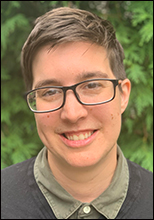
Cam Cannon
Visited: August 2024
Cam Cannon, Doctoral Candidate, American Studies, George Washington University. 2024-2025 ACLS/Mellon Dissertation Fellow.
My research is broadly concerned with the history of gender-affirming care in the U.S., with a particular emphasis on how trans people have variously related to, resisted, and attempted to influence diagnostic criteria and treatment protocols from the 1960s onward. I came to the Transgender Archives to research the work and life of Reed Erickson, an influential trans philanthropist and businessman whose work had a profound effect on the development of trans medicine as a field.
There were a lot of wonderful archival pieces, but I'd probably say my favourite is the program for the 7th International Gender Dysphoria Symposium, held in Lake Tahoe in 1981. For the past few years, I've been trying to gather information about each international gender dysphoria symposium/conference, but never found anything related to the 7th--it was just a big gap in my gigantic archival folder. I'm very glad to somewhat "complete the set" now.
My experience at the Transgender Archives was wonderful. I was able to view many archival documents that I believe do not exist elsewhere, and the staff at the Archives were welcoming and helpful.

Alison Parks
Visited: June 2024
Alison Parks, Assistant Professor of Political Science at Stetson University
I came to the Trans Archives to look at how suicidality was expressed historically among members of the trans community, and to uncover whether the extent to which early “experts” in the medical and psychiatric fields assumed inherent suicidality in their trans patients.
The work is intended to contribute to part of a broader project on the psychic life of queer suicidality that begins with a genealogy of how the queer subject has come to be constituted as a suicidal subject. To construct the genealogy, I read the knowledge produced by “experts” alongside the knowledge produced by “patients,” and look for the ways in which they speak to and against one another. My favorite artifacts thus came from community publications like Transvestia, which would re-publish articles from medical journals interspersed with commentary from the publications’ editors that set the record straight—refuting, correcting, and elaborating the “knowledge” about trans people.
My experience with the Archive was positive from the moment I reached out! Michael even helped advise me on where to select a hotel based on the bus lines that most easily accessed the university. I also really appreciated that Lara helped to gather all of my materials in advance in order to help maximize the time I had.
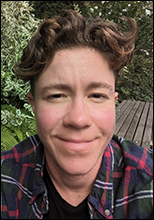
Emi Donald
Visited: June 2024
Emi Donald. PhD Candidate in History at Cornell University.
I came to the Trans Archives to become more familiar with trans print cultures and communities of the late twentieth century. I wanted to find out how different groups and organizations collaborated and drew ideas from each other. I also wanted to get a sense of what kinds of aesthetics carry through early newsletters and magazines, particularly in the context of trans masculine/trans men’s communities. This helped me to put the LGBT newsletters and early activist materials that I have gathered from my research in Thailand into a larger, more comparative framework.
I had a fantastic experience at the Trans Archives. The space was warm and welcoming. The manuscript collections were more expansive than I expected. It was a wonderful place to work. I can’t wait to come back again one day.
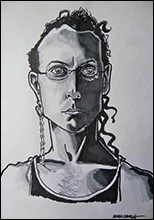
Rosza Daniel Lang/Levitsky
Visited: May 2024
Rosza Daniel Lang/Levitsky, cultural worker and community-based scholar.
I am researching trans periodicals and other writing that's both by and for trans people, with a specific focus on work by trans women (broadly understood) in the period between the post-Stonewall surge of organizing and the "boom" (1974-95). My hope is to publish a collection of this writing; I'm currently reaching out to publishers.
At the Archives, I looked at dozens of un-digitized periodicals, and at the papers of key figures involved with several key magazines and newsletters, and the organizations that supported them (including Ari Kane, Virginia Prince, and Merissa Sherrill Lynn).
The reading room staff were easy to work with and generous with their technical assistance; everyone I corresponded with was sweet and helpful. The turnaround time on receiving materials was speedy, even when I requested absurd numbers of periodicals. And the space itself was bright and airy!
Joshua Falek
Visited: January 2024
Joshua Falek, PhD Candidate in Gender, Feminist and Women’s Studies at York University.
I came to the Trans Archives to read about Human Rights Tribunal cases where trans people sought to achieve recognition, justice and/or freedom from discrimination throughout the 1990s and the early 2000s. In particular, I was interested in the files of barbara findlay due to her role as the lawyer representing Kimberly Nixon in her trials. My dissertation contends with how notions of distress were paramount to the arguments trans people posed in these cases and how trans people navigated whether and how to claim discrimination upon sex or disability (or both).
My favorite item I found while at the archives was the periodical, Transsexuals in Prison. It was a really significant and fascinating insight into transsexual organizing around incarceration.
Being at the archives was a great experience. Everyone who I met—all of the staff, students, archivists, librarians—were extraordinarily warm and helpful. The reading room is a delightful space to work in. While at the archives, I had a few questions and the Special Collections team went above and beyond to answer them and to find the materials that I was looking for.
sasha skaidra
Visited: October 2023
sasha skaidra, Killam Memorial Postdoctoral Research Fellow at the Department of Political Science, University of Alberta.
I visited the archives to amass geospatial data that could be used to map the activities of transnational transgender civil society shaping and resisting the current international legal infrastructure surrounding LGBT rights. Current International Sociolegal Literature presents this development as primarily driven by the Global North, overgeneralizing the South as homophobic. The association of LGBT politics with Western hegemony compounds the ‘cartographic gaze’ wherein state borders depend on solely linear demarcations to determine legitimate claims to territory. My research utilizes a counter-mapping technique using Geographic Information Systems to intervene on current homonationalist narratives and state-centric cartography, which erases the work of local and transnational 2SLGBTQI+ civil society.
My favorite item was the Proceeding of the 2nd International Conference on Transgender Law and Employment Policy. In it, I discovered the writings of Martine Rothblatt and Phyllis Frye who crafted cogent challenges to the sex/gender distinction which they rightly predicted, would be used by medical practitioners to remain gatekeepers over transgender healthcare.
The library staff in the Archive's reading room and Aaron Devor were super helpful, kind, and polite! They never failed to answer my queries and point me in the right direction. Thank you! :)
Shaan Knan
Visited: September 2023
Shaan Knan (he/him), a UK-based heritage practitioner, affiliated with the Gender Identity Research and Education Society (GIRES); doctoral candidate at the University of Brighton.
My research at the Transgender Archives focused on exploring trans community organisations’ collections in North America; one of the aims was to feed into my current oral history and archive project, documenting the history of GIRES - one of the longest standing UK trans+ charities. Further, being mindful of my Eurocentric lens, I wanted to learn about the history of North American trans+ organisations, their set-up, governance, founders and stakeholders.
I spent much of my time at the Archives examining the records of the International Foundation for Gender Education (IFGE), as part of the Rikki Swin collection. This non-for profit was founded in November 1986 by Merissa Sherrill Lynn (1942-2017) and closed down in the late 2000s. I was fascinated by its ‘interconnectedness’ story, publications, and historical significance. For instance, as of 1996, IFGE was one of three national transgender organisations in the United States to have an actual office, and apparently the only transgender organisation in the country to have paid staff.
As an oral historian, I was very excited to come across verbatim transcripts from audio tapes recorded at the 1st IFGE Convention in 1987, Chicago. In particular, the ‘How to form an organisation’ panel sparked my interest as it featured so many voices and experiences of trans+ community organisers in their time. This really gave me a much better understanding of the North American trans+ community networks in the late 20th Century, and will hopefully help me to reflect deeper on similarities and differences with the UK, and to make comparisons with the set up and dynamics of organisations nowadays.
I had a fantastic week at the UVic Transgender Archives. Everyone was really welcoming, and special collections staff were very helpful to get me what I needed swiftly and diligently. It was such a privilege to be able to have physical access to the archives’ collections – I find having the materials right in front of you is actually quite an emotional experience. One of the highlights of my trip was meeting up with Dr. Aaron Devor and having the opportunity to talk to him about my research – and getting some first-hand insights!
Cameron Awkward-Rich
Visited: August 2023
Associate Professor of Women, Gender, Sexuality Studies at University of Massachusetts Amherst
I came to the Trans Archive to look at as much of the newly-acquired Red Jordan Arobateau collection as possible. Among other things, I am currently in the long middle of editing a volume of Arobateau's journals and wanted to gain a more intimate picture of his life and a more robust sense of how he/his work circulated in the late 1970s-90s.
Going into this trip, I knew that Red was a character who was constantly generating material and my time with his papers really confirmed that; it's difficult to pick a favorite find. Perhaps the recording of a staged read-through of a play of his, which almost had a three-week run at The Center for Sex and Culture in 2006? He mentions the dissolving of this play often in his journals so it was great to get to see it.
I had a lovely experience. The archivists and staff were incredibly responsive and helpful, both before I arrived at UVic and while I was in the reading room.
Dade Lemanski
Visited: April 2023
Independent Researcher
I came to the Trans Archives to conduct research in the Niela Miller archive. Miller, a cis Ashkenazi Jew, practiced Gestalt therapy, a modality introduced by Fritz and Laura Perls, Jews who studied psychotherapy in the Freudian tradition and fled Germany, first for South Africa and then New York City, due to the rise of Nazism in 1933. I was particularly interested in Miller’s use of Gestalt practices to support trans people, whom she termed “gender identity explorers.”
In 1996, after years of close work with both individual trans clients and the trans community more broadly, as well as teaching about transness through an empowering and normalizing lens at gender conferences across the United States, Miller published the first book specifically for clinicians working with trans people, Counseling in Genderland.
At the University of Victoria, I read Miller's archive, and spoke to trans women who had worked with her at Fantasia Fair, and who I met through the Moving Trans History Forward conference, to investigate how Jewish wisdom about embodiment refracts through the work of post-Holocaust somatics practitioners to support trans people, which is to say what somatics practices originating in Jewish thought have to offer trans people, and why it is that a cis Jewish practitioner of a therapeutic practice originating from cis Jewish psychotherapists would have so much to offer trans people navigating the hostile American social landscape of the 1980s and 1990s.
I had a really wonderful time in the archive. Everyone I met who worked at the library and archives was warm, prompt, and flexible, helping me navigate difficult VCR systems and to trace niche lines of interest. I felt very supported in my research, taken seriously and with care in ways that allowed me to think deeply about the material I was researching.
Ariel Goldberg
Visited: January 2023
Independent Curator, Writer
I am writing a book of photography history spanning the 1970s-1990s that focuses on educational projects within trans and queer grassroots organizing. This means looking at how image cultures were built and cultivated through relationships, circulation of materials and other collective processes.
I had an inspiring visit at UVic studying the materiality of images as they appeared in trans periodicals such as Metamorphosis and Image. I spent time with a wide range of photographic materials that served different purposes: heavily mimeographed portraits of Radcliffe Hall, Harry Benjamin mock-ups, endless envelopes of Fantasia Fair performances, meals, gatherings, gorgeous glossy portraits made by Efráin Gonzalez in NYC’s meatpacking district, the list could go on. I am interested in experiencing as wide a range of images as possible.
The other focus in my time at UVic was spent understanding the processes that made images public, or restrained them from view, such as photo release forms and correspondences that directly address how risky it was to be visible as a trans/queer person. I perhaps learned the most about the TS/TV/CD community that formed around Fantasia Fair and Ariande Kane’s Human Outreach & Achievement Institute, that ran as an educational resource and visited conferences like Society for the Scientific Study of Sex, Inc).
I had a fabulous time at UVic and felt that my four days were way too short. The highlight of my trip was meeting Aaron Devor and speaking with him about my research and as a photographer himself, he guided me in making the most of my visit.
Hannah K. Grabowski
Visited: April 2023
PhD Candidate in Gender Studies at Arizona State University.
I came to the archive to engage with newsletters from the 1970s-1990s from the U.S. and Canada. These publications are the foundation of my forthcoming dissertation and I specifically searched for references and descriptions of gender euphoria.
I found newsletters from both my hometown in Northeast Ohio (La Femme Silhouette) and from the Phoenix Metropolitan Area (Alpha Zeta & A Rose) where I have lived for the past 8 years. Recognizing the names of streets, bars, and restaurants that my trans and gender diverse elders frequented was an emotional experience.
I very much cherished my time at UVic. The entire experience went smoothly and the space and materials were very accessible. Even though my trip was short, I felt I bonded with students and staff. And I admire the entire atmosphere and culture of the larger city. I hope I can return in the near future.
Tristan Josephson
Visited: September 2022
Tristan Josephson, Associate Professor of Women's and Gender Studies at California State University, Sacramento.
I came to the Trans Archives to do some exploratory research for a new research project on feminist and trans anti-violence activism and organizing in the 1970s, 80s, and 1990s.
I spent most of my time looking at transvestite and transsexual publications from the 1970s, 1980s and early 1990s, such as Outreach Newsletter, Drag magazine, Transsexuals in Prison, Transsexual News Telegraph, and TransSisters. With the exception of the issues of Transsexuals in Prison, I didn't find that much material that focused on anti-violence organizing in these publications, other than brief mentions of police brutality and references to some grassroots trans organizations that worked on issues of anti-trans discrimination and legal/medical issues. However, looking at these publications did start to give me a sense of some of the larger conversations that were happening during this period around gender, sexuality, and feminism within certain trans communities, circumscribed by race, gender, and socio-economic class status.
I had a good experience with the archives. The staff were friendly, helpful, and responsive, both before my visit and while I was at the archives. The reading room was comfortable and quiet.
Slava Greenberg
Visited: October 2022
Slava Greenberg is a postdoctoral fellow at the University of Southern California School of Cinematic Arts and Casden Institute. His research explores the potential of mainstream and emerging media forms to offer transformative experiences in reference to disability studies, trans studies, and gender. He is the author of Animation and Disability: Cripping Spectatorship (Indiana UP 2022) and co-editor of Fireflies: Journal of Film and Television II. His articles have appeared in Review of Disability Studies, Animation, TSQ, Jewish Film and New Media, Frames Cinema Journal, and forthcoming in The Moving Image, and Journal of Feminist Studies in Religion. He is currently working on a second book project focusing on the history and visual culture of gender dysphoria centering on Reed Erickson.
Kaci Switzer
Visited: June 2022
Kaci Switzer (they/them), MA student in Gender and Social Justice at McMaster University.
I visited the Transgender Archives to facilitate my MA research on the experiences of 2SLGBTQ+ individuals who had/have an affiliation with Christianity in order to gain a deeper understanding of the ways that trans communities engage in radical acts of love through community care.
It is hard to choose a favourite item from my visit to the archives, but one that stands out is a pamphlet titled "Religious Aspects of Transexualism" published by Erickson Educational Foundation (1971). This is a short book that contains uplifting information about transsexualism within Christianity, presented through comments from clergy of various denominations. The stories of trans folks who have a background with Christianity are often riddled with pain, but the Church can also be a space for community care. This book is reflective of the multitude of ways that trans communities protect and care for one another and will be very influential for the further development of my research into queer and trans care models.
My experience at the archives was beautiful and powerful. The tactile experience helped me connect deeply to queer and trans history in a way that reminded me our communities are now, and will always be, interwoven between the past, present, and future. I was able to access materials that I would have never known existed if not for this opportunity.
Luka Austin
Visited: May 2022
Luka Austin—undergraduate student, Haverford College, class of 2024. (she/her).
I came to the Trans Archives to examine documents by trans authors with an eye towards their perspectives on the world around them beyond just the trans community. This included examining correspondences, personal journals, unpublished manuscripts, art, photographs, and poetry by Reed Erickson, Virginia Prince, and Aiyanna Maracle.
My favorite document I found in the archive was Virginia Prince’s handwritten journal containing drafts of multiple original short stories (Filed 21.7 in the Virginia Prince/Rikki Swinn collection). These stories were fascinating and creative—many of them were science fiction, and function as a window into Prince’s mind, coloring her view of the world through her prosaic style and choice details. Of these short stories, my personal favorite was “Suzan,” the final short story of the book. It tells the tale of a scientist who invents a machine that allows him to perform ‘mental surgery,’ and who then ends up trapped in the body of a 2-year-old girl. “Suzan” prevents a very ‘transgender’ scenario, but beyond this, it is also an artifact authentically of the 1950s, grappling in a larger sense with the rapid progression of medical technologies and their impact on the human mind—something relevant beyond the transgender community. Because this document had not been published anywhere prior to my research, I did not photograph it, instead summarizing and quoting in my notes.
I had a great experience at the Trans Archive! I found all the staff to be extremely welcoming, and very willing to scan documents on request. I am extremely grateful for all the assistance provided to me, and for the friendliness of the archival staff.
Cáel M. Keegan
Visited: May 2022
Cáel M. Keegan, Fulbright Distinguished Research Chair of Arts and Social Sciences, Carleton University, Associate Professor of Women, Gender, and Sexuality Studies, Grand Valley State University
I came with some broad-ranging thematic interests in mind, wanting to look at a range of materials to gather ideas for my current book project. My book focuses largely on film texts, but I wanted to add more resources on television and also look for materials that would help me map community engagement with these media texts at the time of their original circulation. While I planned to look at a lot of the holdings in a cursory sense, I was really hoping for a "breakthrough" research moment that I could write about from a first-person perspective.
It was wonderful. I really appreciated the time that the staff and director took to meet with and help the researchers. I wish I could have stayed longer! It was slightly complicated to get started on my first day with all the clearances and processes I needed to follow for the library and archives, and several key people were on vacation, but once I got started things were very smooth.
Chamindra Weerawardhana
A Sri Lankan national, Dr Chamindra Weerawardhana is an international LGBTQIA+ rights activist, political lobbyist and academic. Her research interests focus on the intersections on decolonial intersectional feminist epistemologies, politics of deeply divided societies, women in politics, and global South/intersectional feminist IR.
Flora Renz
Flora joined Kent Law School in 2017 as a Lecturer. Flora was previously a Lecturer in the Law School at City, University of London. Flora’s research interests lie broadly in the area of gender, sexuality and law and the legal regulation of identities.
Terrence Abrahams
My name is Terrence Abrahams, and I am an MA student from Ryerson University’s Literatures of Modernity program. I came to research poetry written by transgender people and the developments in the poetics of such writing, and was particularly interested in the periodicals and selection of anthologies that the TGA has in its collection. I was able to access poetry written by those based in North America as far back as 1967, which would have been nearly impossible otherwise!
These documents were invaluable to me, as, again, much of the poetry by trans people written prior to the early 2000s is difficult to access due to the fact that it has largely not yet been digitally archived. I was also able to access the thoughts and personal process reflections on the writing of poetry and poetics from a variety of trans writers in the collection as well, which was immensely helpful in regards to my ongoing research.
My experience at the TGA and with all the staff was excellent. Everyone was helpful and welcoming, and the archivists in the special collections section worked quickly and diligently to get me what I needed, and were always willing to answer any questions I had or confusions I came across. I enjoyed the quiet atmosphere of the study space and was happy to have my materials set aside for me over the course of several days for ease of access.
2019 Summer Interns
Vithória Dill
Rodrigo Alvarenga
Sky Karp
Laura Horak
Laura Horak is an Associate Professor of Film Studies at Carleton University. She visited the Transgender Archives to research the history of trans, Two-Spirit, nonbinary, intersex, and gnc people making films.
I had a wonderful experience! I watched many interesting films and videos by and about trans people, including materials from the 1970s-1990s, and was happy to find many short articles in the trans periodicals collection. Everyone was very helpful.
Elliot Marrow
Elliot Marrow is a Clinical Psychology PhD student at the University of Massachusetts, Boston. He is researching the development of the Harry Benjamin International Gender Dysphoria Association (now WPATH) Standards of Care and trans perspectives on early gender identity research.
I felt very privileged to be able to visit the archive, and the staff were very helpful in tracking down items I needed. I had the chance to use the cataloguing work of the archive's interns to find relevant documents I could never have found otherwise. Thank you so much to everyone at the archive for preserving these materials and making this research possible!
Nick Mulé
Nick Mulé is an Associate Professor from York University. Nick came to the Transgender Archives to work on his research study, 'Queer Liberation Theory: Resurrection and Development.'
Great experience as I was able to access important documents regarding notions of liberation for trans people.
Art Blake
Art Blake is an Associate Professor in the Department of History and in the Joint Ryerson-York Graduate Program in Communication and Culture, at Ryerson University, Toronto. His most recent article is "Re-Dressing Race and Gender: The Performance and Politics of Eldridge Cleaver's Pants," in Fashion Studies, Volume 1, Issue 1 (2018) www.fashionstudies.ca
It's been great to immerse myself in the Transgender Archives for a few days, looking through parts of the amazing Rikki Swin Institute collection. My current research project looks at histories of cross-dressing people categorized as male in the UK, Canada and the USA from the late 19th through the late 20th century. The project is both a history of dress and style within often hidden communities as well as a history of how cross-dressers developed communication networks to find safe ways to "see and be seen."
Trish Salah
Born in Halifax, Trish Salah is the author of the Lambda-award-winning, Wanting in Arabic, and of Lyric Sexology Vol. 1, and co-editor of a special issue of TSQ: Transgender Studies Quarterly on Transgender Cultural Production. In 2018 she was a finalist for the Dayne Ogilvie prize for emerging LGBTQ writers. She has fiction in the science fiction and fantasy anthology, Meanwhile, Elsewhere and poetry in recent and upcoming issues of Anomaly, Cordite Poetry Review, Prism International, Supplement and Touch the Donkey. She is associate professor of Gender Studies at Queen’s University.
It was wonderful to have time in UVic's Transgender Archives, specifically with Aiyyana Maracle's papers which are now housed there. Aiyyana's work in theatre and performance is such an important component of trans and Indigenous art histories in Canada, and I'm looking forward to working with the collection in the coming months and years to come. The Chair and Archives staff were also kind enough to host my poetry reading and it was a really lovely night with a generous and thoughtful audience. Clearly there is a very engaged community forming around the archives.
Jules Gill-Peterson
Jules Gill-Peterson is Assistant Professor of English and Gender, Sexuality, and Women’s Studies at the University of Pittsburgh. She is the author of Histories of the Transgender Child (University of Minnesota Press, October 2018).I am visiting the Transgender Archives to research my current book project, Gender Underground: A History of Trans DIY, which sets out to retell the story of the trans twentieth century by framing it not through institutional medicine, but the myriad do-it-yourself practices of trans people that forged powerful and long-invisible social worlds. Visiting the Transgender Archives at UVic is an unmatched chance for me to build, share, and learn from a “DIY trans studies” that affirms the survival and creative world-making of the least visible and enfranchised in our communities: low income, trans of color, and two sprit communities.
Kyle Shaughnessy
Kyle Shaughnessy is a Two-Spirit, trans person of mixed Indigenous (Dene) and European ancestry. He is a social worker and writer originally from the Northwest Territories and rural BC with a strong background in public speaking, education, community building, and youth advocacy. Kyle is currently completing his MSW at Dalhousie University, focusing his thesis work on Two-Spirit pedagogy, and works at Trans Care BC as the Education Lead for Indigenous Communities and Children, Youth & Families.
"It was incredible to touch base with the history of my own community."
Charles Ledbetter
Charles Ledbetter is a writer, activist and PhD candidate at the University of Tübingen in Germany. A graduate of the Orange County foster care system, Charles received a BA in English Literature from UCLA and an MPhil from the University of Cambridge. Their doctoral dissertation analyzes the intersection of trans and posthuman themes in contemporary speculative fiction.
This fellowship at the University of Victoria’s Transgender Archive grants me the opportunity to study texts written by trans folks for trans folks and the liberatory imaginaries therein.
Jonah Garde
As a Gender and Cultural Studies PhD student the Visiting Fellowship allows me to further my research on trans temporalities and I am immensely grateful for the opportunity to work in the extraordinary archive. As trans* identified scholar, community member and organiser I am especially interested in the history and the structure of the archive itself, as it is my dream to set up a trans*inter* archive in Vienna, as the few existing feminist and queer archives are either not accessible to trans* people or do not consider trans* histories as integral part of their archives. In my view archives are extremely important for our understanding of trans* politics and building communities that are grounded in various histories. Besides following my research interests, the Visiting Fellowship gives me the unique opportunity to meet and connect with other scholars, community members and activists and to continue building transnational networks that are pursuing transfeminist, anti-racist and anti-colonial politics.
Son Vivienne
Son Vivienne is a Post-Doctoral Researcher at Creative Agency and the Digital Ethnography Research Centre at RMIT. Their principal expertise is digital self-representation, online activism, queer identity, and rhetorical strategies/feminist practices for speaking and listening across difference.
Son is also involved in community development and arts as an activist, workshop facilitator and media-maker. Son is author of Digital Identity and Everyday Activism: Sharing Private Stories with Networked Publics (Palgrave Macmillan) and co-author/co-editor of Negotiating Digital Citizenship: Control, Contest, Culture (Rowman & Littlefield). Son curates several collective storytelling websites for queer (www.rainbowfamilytree.com)and gender-diverse (www.storiesbeyondgender.com) communities and has over twenty years of multi-media production and distribution experience.
As an award-winning writer/director/producer of drama and documentaries, they tackled subjects as diverse as youth suicide; drug cultures in Vietnamese communities; and lesbian personal columns. Their film work includes multi-lingual (Vietnamese-English and Adnyamathanha-English) and multi-modal (animation, micro-docs, digital storytelling and interactive web-platforms) projects that reflect their comparative, cross-cultural and critical approaches to communication and storytelling. You can contact Son via their website at www.incitestories.com.au or twitter @sonasterisk.
Christopher Wolff
I feel incredibly grateful and honored to receive this fellowship from the Chair in Transgender Studies. My immigration status as well as my financial means don't allow me to pursue a further university degree. The community-based fellowship now gives me the opportunity to do research on behalf of issues benefiting the trans community. Thank you!
Anna M. Kłonkowska
Anna M. Kłonkowska is an Assistant Professor at the Department of Social Sciences, University of Gdansk. She is a sociologist, psychologist, philosopher; her research interests include: transgender studies, men’s studies, sociology of the body. Dr. Kłonkowska facilitates one of the few support groups for transgender people in Poland since 2010 and cooperates with organizations supporting transgender people in Poland. She is a recipient of Fulbright Senior Research Fellowship (Stony Brook University), Kosciuszko Foundation Fellowship (Stony Brook University), Bednarowski Trust Fellowship (University of Aberdeen), Deutscher Akademischer Austauschdienst Fellowship (Albert-Ludwigs-Universität, Freiburg).
This research addresses in detail the situational experiences and social circumstances of transgender people living in Poland. Based on results arrived at through the author’s research, the paper focuses on a number of accounts by transgender people regarding their social reception and the processes of “normativization” of their identities, as experienced in the interactions with experts who oversee the medical and legal transition related procedures. The arising problems which transgender persons face in these situations is highlighted by the severity of the kinds of social pressure which are placed upon them, most of which is aimed at teaching them to conform accordingly to the normative patterns of masculinity and femininity as commonly acknowledged in Polish society. Non-normative and non-binary identifications in transgender persons are not treated by officials in Poland, as well as by social environment, as authentic expressions of transgender. Consistent with the Foucauldian concept of power-knowledge, this discourse legitimizes a particular idea of the social order and supports particular strategies of normativization. Polish transgender persons’ attitudes to these pressures and their subsequent responses are herein analyzed.
Obtaining The Chair in Transgender Studies Fellowship has a huge significance for my research. It will allow me to study resources for the project on misleads and misunderstandings in trans- and cisgender people’s communication. It will also be an opportunity to meet scholars affiliated with The Transgender Archives, learn about their work experience and share my own research outcomes. I’m convinced that the visit at The Transgender Archives will not only be an important inspiration for my academic work, but for further activism in favour of the transgender community as well.
Kevin Laxamana
Kevin Laxamana is a Master’s student in the Department of Anthropology at the University of Alberta. He is currently writing his thesis on the disrupted life cycles of Singaporean and Balinese transgender women by analyzing their diverse experiences, histories, and stories of transitioning and de- transitioning (in relation to hormone therapies and sexual reassignment surgeries, participation in beauty and/or sex work, religion, romantic and familial relationships, and concepts of national belonging). Kevin completed his ethnographic fieldwork in Singapore and Bali (Indonesia) in partnership with Project X-Singapore and Yayasan Gaya Dewata in the summer of 2017. His research interests broadly include non-normative genders and sexualities, gendered religious performances, intimate partnering models, kinship, queer landscapes and imagined spaces, beauty pageants, Filipino studies, and the anthropology of food.
Personally, it means a lot to me knowing that the world's only Chair in Transgender Studies supports my research. It would mean so much to the people I'm studying back in Singapore and Indonesia that their stories are recognized and supported by the Chair and the Transgender Archives.
Abigail Clayton
Abigail Clayton is a senior in the Women's, Gender, and Sexuality Studies program at Yale University. Abigail visited the Transgender Archives in July 2018. Abigail is researching the personal experiences of transgender people incarceration, and how identities are negotiated in highly regulated spaces.
The Transgender Archives have been wonderful to work with...they've been open and friendly. I found a wealth of material, which I wasn't expecting because it's such a niche topic.
Anita Miettunen
Anita Miettunen is a student in the Master of Arts in Children’s Literature (MACL) program at UBC. Anita's July 2018 visit to the Transgender Archives informed her children's book project where the novel’s protagonist’s parent is transgender.
It has been fantastic! It's generated creative ideas that I wouldn't have thought of otherwise...The staff have been fabulous. I'm feeling really privileged and it's been wonderful to have this opportunity. Thank you.
Susan Stryker
Susan Stryker is an award-winning scholar and filmmaker whose historical research, theoretical writing, and creative works have helped shape the cultural conversation on transgender topics since the early 1990s. She is an Associate Professor of Gender and Women’s Studies at the University of Arizona and is the coordinator of the university’s Transgender Studies Initiative. In addition to serving as founding co-editor of the academic journal TSQ: Transgender Studies Quarterly, she is currently developing several media projects, and has a book under contract to Farrar Straus Giroux, What Transpires Now, about the uses of transgender history for the present.
It's absolutely worth coming. It's a beautiful location...the collection itself is amazing. I wish I had a month to spend in it instead of just a week. I highly recommend it.
KJ Cerankowski
KJ Cerankowski is assistant professor of Comparative American Studies and Gender, Sexuality, and Feminist studies at Oberlin College. Cerankowski co-edited the book Asexualities: Feminist and Queer Perspectives (Routledge, 2014) and has published articles in the journals Feminist Studies and WSQ (Women’s Studies Quarterly).
My experience in the Archives was wonderful! It was totally worth the journey here to Victoria.
Alex Bakker
Alex Bakker is a freelance historian and writer who visited the Transgender Archives in March 2018 to research materials that referred to or reflected on Dutch transgender history.
It was great! I felt very welcome and did my research in the calm yet inspiring reading room, helped by the very nice and extremely fast people at the desk. Surrounded by boxes of paper I got an impression of the extent of the TGA. The vastness and relevance are beyond question. I especially enjoyed browsing through the scrapbooks of Reed Erickson, who in the early 70-ies was in contact with Otto de Vaal, whom I refer to as the ‘Dutch Harry Benjamin’. My visit ended with the Moving Trans History Forward conference: this was a real treat. I met many people from around the world who were equally fascinated by transgender history, mostly because they personally feel part of it. Thank you very much for making my visit possible; it was intensely rewarding.
Maria Sundin
Maria Sundin is a senior Swedish trans activist, sexologist and clinical social worker. She has been involved in trans as well as LGBT organizations for the past 25 years. She is a member of the Innovative Response to Global Trans Women and HIV (IRGT). She also serves on the Steering Committee of The Global Forum on MSM & HIV (MSMGF) and is a Board Member of Sweden's LGBTQ Social Democrats. Maria served for a long period as a Board Member of the Swedish Federation for LGBTQ Rights (RFSL) as well as a Co-chair and Executive Board Member of Transgender Europe (TGEU). She is also extensively involved in trans de-pathologisation, transgender human rights and combatting HIV in our community. During Maria's March 15-27, 2018, visit she reviewed Swedish language archive materials and provided brief English descriptions.
It was an amazing experience going over this fantastic Archive.
Syrus Marcus Ware
Syrus is a Vanier Scholar, visual artist, activist, curator and educator. He uses painting, installation and performance to explore social justice frameworks and black activist culture. His work has been shown widely, including at the Art Gallery of Ontario, the University of Lethbridge Art Gallery, Art Gallery of York University and The Gladstone Hotel. His performance works have also been part of festivals across Canada. He is a facilitator and designer at The Banff Centre, and for 12 years was the Coordinator of the Art Gallery of Ontario Youth Program. Syrus is the inaugural Daniel’s Spectrum Artist-in-Residence (2016/17) and is also a core-team member of Black Lives Matter- Toronto. Syrus is currently working on a PhD at York University in the Faculty of Environmental Studies.
It has been incredible! It's one of the fastest archives I have even been in, where you can ask for something and within minutes it appears. It's so important to have spaces like this accessible and open to the public.
Lorna Barton
Lorna Barton is a 4th year PhD candidate at the University of Strathclyde in the Scottish Oral History Centre. She visited The Transgender Archives in October 2017.It is amazing and I'm devastated that I'm not here longer. I will definitely be back. It's an absolute wealth; it's so rich. Everyone has been friendly and the archivists have been really amazing in terms of access and getting all the materials really quickly to me. Everyone has been incredibly inviting and welcoming. It's been brilliant!
David Shively
David Shively is a MLIS/MAS student from UBC who visited the Transgender Archives July-September 2017 to do a practicum. He performed indexing and provided descriptive metadata for a scrapbook donation from the Univeristy of Ulster TGA collection.
My experience was extremely positive. Lara and Jane offered helpful guidance in realising the project and the work environment was relaxed and efficient. Fascinating materials and a good chance to put some training into practice.
Elias Capello
Elias is a medical anthropologist who is examining materials in the Transgender Archives to better understand the linguistic patterns of how transgender people disseminate knowledge about their bodies and health. The linguistic patterns of how transgender people communicate about their bodies will be compared with the research papers in the archives. Elias focuses on themes of embodiment, dissemination of knowledge about bodies, health, and resilience.
Everyone was generous with their time, which enabled me to get a vast amount of work done. I was able to sift through several well-known periodicals and lesser-known periodicals to contextualize my research on how transgender people have distributed medical knowledge to each other to empower each other not just through journal articles, but through poetry, comics, and advice columns published in the periodicals. This work will help me design my dissertation research. All in all it was a great experience--everyone from Dr. Aaron Devor to the staff of the archives were incredibly supportive and helpful.
Paula Martin
Paula Martin is a PhD Student at the University of Chicago, Department of Comparative Human Development. She came to the TGA with the support of the SPA/Robert Lemelson Foundation Student Fellowship to use the Rikki Swin collection and to think about how formal knowledge producing systems and activist movements impact the conceptualization and implementation of treatments for gender.
I was able to use material in the TGA to help contextualize the research I do with contemporary providers and young gender expansive people in the US. Everyone involved from the librarians to the other individuals using the archival materials were kind and welcoming. The TGA is a great resource, and I definitely strengthened my project by spending time there.
Kai* Brust
Kai* Brust is a History and Political Science student at TU Darmstadt (Germany). From May-July, 2017, they participated in an international internship through Mitacs at the Transgender Archives, where they gathered metadata about transgender activist networks from the 60s till the early 2000s. During this time they worked with several periodicals, mostly newsletters and journals from more than 20 groups. Focusing on North America they also worked with periodicals from Germany, Australia, New Zealand, France, Belgium and the Netherlands.
Being able to get an insight into the Transgender Archives unique holdings at such a broad scale equipped me with more knowledge about past transgender activism than I ever thought could be possible in just three months. My stay at the Archives taught me how to navigate through Transgender History and challenged me to understand, in which way groups of transgender, transsexual, transvestite, crossdressing and gender-nonconforming people raised their voices against the discrimination they faced in the past and what this had to do with their general standing in society.
Cyle Metzger
Cyle is a PhD Candidate at Stanford University in the Department of Art History with a PhD minor in Feminist, Gender and Sexuality Studies.
My experience at the archives was crucial for the development of my work in transgender art and visual history. In particular, the photos from the original publication of Harry Benjamin’s Transsexual Phenomenon and the seemingly innumerable works in the collection of Barbara Jean’s Petticoat Punnishment work have become key features of the historical narrative I am trying to build.
Kate Redburn
Kate Redburn is a JD-PhD student at Yale Law School and Yale Department of History. Kate researches trans legal history at the beginning of U.S. trans political organizing in the mid-1960s to the present. Their preliminary questions relate to the toppling of anti-cross dressing laws, the legal strategies (or lack thereof) in trans organizing, and the penetration of legal categories and legal habits of mind in trans politics.
Abram J. Lewis
Abram J. Lewis is a postdoctoral fellow in the Sexualities Project at Northwestern University in Chicago. Abram is working on a book project examining the role of supernatural, paranormal, and other forms of "irrational" experience in 1970s queer, feminist, and trans activism. He visited the Transgender Archives to research Reed Erickson’s support for new age projects.
“Everyone has been great -- the staff are great and the archives really easy to use (getting boxes minutes after requesting them is a research game changer). Aaron Devor was very generous in meeting with me and sharing his expertise about Erickson's life. And the Erickson papers are really extraordinary. I definitely recommend checking them out, even if only for his doodles and limericks.”
Beck Gilmer-Osborne
Beck Gilmer-Osborne is a queer trans-media artist who is doing personal research for graduate studies and a curatorial collections practicum at the Banff Centre for Arts and Creativity. They visited the TGA to gain access to trans histories and ephemera that cannot be found elsewhere. Beck is invested in addressing archival gaps when it comes to Queer, Trans, Black, Indigenous, People of Colour (QTBIPOC) content/stories/contributions.
“The staff were incredibly friendly and helpful with my inquiries. Dr. Devor came down to the archives to meet with me personally and helped me navigate the archival database…I was particularly interested in Harry Benjamin's photographs and notes for "The Transsexual Phenomenon." Holding those images before they were censored was quite overwhelming.”
Michael Radmacher
Michael Radmacher is a recent graduate student of library and information science who currently works with the Chair in Transgender Studies at the University of Victoria. Michael utilized the Transgender Archives during his studies by digitizing a portion of the Rikki Swin collection featuring Virginia Prince.
I always jump at the chance to dig through The Transgender Archives and to review the unique materials. Special Collections and University Archives is a beautiful and peaceful space to perform research; Lara and her staff are always hospitable and helpful. Thank you!
Xanthia Hargreaves
Xanthia Hargreaves is a law student & research scholar at the University of Oxford. Xanthia’s August 2016 visit to The Transgender Archives was a part of her comparative research project on LGBTQ history and cultures across North America.
I had a fantastic experience - it was incredible to see the range that the Archives has accumulated, and to hear about where it began and where it is heading!
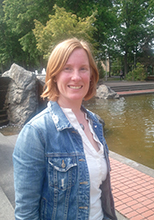
Jeannie Bail
Jeannie Bail is the Director of Learning & Research Services at UNB Libraries. She sees libraries as trans allies, and works to create and promote inclusive spaces, services and resources for LGBTQ communities.
After reading about the collection from all the way across the country, it was exciting to get to use the TGA in person. The entire staff was beyond helpful, and thank you Aaron and Lara for meeting with me while I was in town. The importance of the archives was underscored by a something I read in the Virginia Prince fonds (21.23). It was a letter to Virginia from a physician who wrote that "all my education about my dual gendered nature has come from community literature, not from what I found in the medical library.
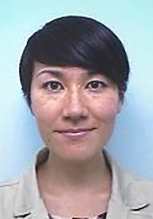
Sonja Pei-Fen (SPF) Dale
Sonja Pei-Fen (SPF) Dale is an adjunct assistant professor at Hitotsubashi University in Tokyo, Japan. After attending the Moving Trans History Forward 2016 conference, Sonja came to the Transgender Archives to review Japan-related materials which Sonja says are difficult to access in such numbers in Japan.
It was lovely! The librarians were very helpful, and I enjoyed looking through the materials you had available. I also felt inspired to start up an archive of some sort in Japan - at present there does not exist anything similar.
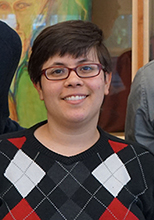
Carter Lynn Thurmond
Carter Lynn Thurmond is a volunteer at the Tretter Collection LGBT archives in Minneapolis, MN., and is an Image Archivist for General Mills. Carter is developing a photo book using historic images of gender non-conforming lesbians assigned female at birth (trans/dykes). The images will be collaged together along with intriguing texts and quotes.
My experience with the Trans Archives was fantastic. I really enjoyed perusing through the FTM Newsletters and other news clippings and journals.
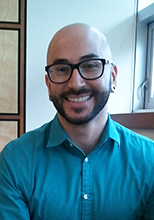
Demetrios Psihopaidas
Demetrios Psihopaidas is a PhD Candidate in Sociology and a Graduate Research Enhancement Fellow at the University of Southern California. Demetrios came to the TGA as part of his international research project Unsettled lives: How transgender became a global health policy priority (1966-2016). The project traces 50 years of science and policy-making affecting transgender persons, and community-based efforts to shape them.
My time at TGA was exceptionally positive. The archive is housed in a really bright room with lots of big windows, which is such a nice change from the windowless-norm. Also the special collections staff has the material so well organized and they're so nice and hard-working, that I never had any difficulties or delays getting access. They really had to shove me out at the end of each day, I never wanted to leave.
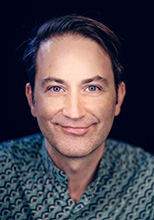
Kevin Allen
Kevin Allen is the Lead Researcher for the Calgary Gay History Project. Kevin came to source Calgary citations in the Transgender Archives as well as attend the Moving Trans History Forward Conference.
The reading room is very comfortable and the archive staff friendly. This was my second visit to the archives, Lara gave me a tour last year, and Aaron gave me a recap of its genesis. We are planning on setting up our own queer archives in Calgary so seeing how other institutions are set up is useful.
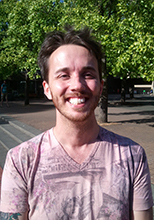
B Lee Aultman
B Lee Aultman is a PhD candidate in political theory at The Graduate Center, City University of New York and lecturer of political science at Purchase College in Purchase, New York. B’s dissertation is a study of the epistemological dimensions of transgender political resistance. It explores how "transgender" is, and has been, constructed within the realms of law, the political, and cultural memory (the archives).
My visit to the transgender Archives was one of the most memorable and intellectually fulfilling experiences of my graduate career. I would recommend anyone interested in transgender studies to visit and make use of this tremendous resource.
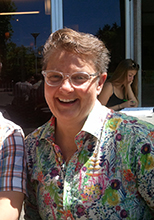
Ardel Haefele-Thomas
Ardel Haefele-Thomas is the chair of the LGBT Studies Department at City College of San Francisco, CA. USA.
She is co-authoring the first Introduction to Transgender Studies textbook.
She came to the Transgender Archives to research “underground” trans culture before the internet.
What was stunning to me were all of the amazing underground ‘zines that had a trans* focus….There are also specific collections in the archive that focus on the importance of transgender pioneers …. who really began to empower the community and take it upon themselves to wrest the information away from medical practitioners who might not have trans* people’s best interests at heart.
I have had a lot of really diverse archive research experiences. At Stanford University, I often utilized the Hoover Archives …. I felt that the UVic Transgender Archive experience was on par with that. This is really something to think about because this Transgender Archive is …. not the hugely endowed institution or library that we know a place like Stanford to be. … I, personally, found every single one of the librarians working there to be just phenomenal. ….. This was by far the most personal, warm and efficient archival research experience I have ever had.

Jamie A. Lee
Jamie A. Lee is an assistant professor of Digital Culture, Information and Society, in the School of Information at the University of Arizona; a member of the Faculty Advisory Committee, Institute for LGBT Studies; and Archivist/Project Director of the Arizona Queer Archives.
She visited the Transgender Archives to conduct research for her dissertation, “A Queer/ed Archival Methodology: Theorizing Practice through Radical Interrogations of the Archival Body.”
I had a wonderful experience, first participating in the inaugural Moving Trans Histories Forward Conference, and then moving into direct archival research. Lara and Aaron were both so helpful in sharing their processes and practices in archival development and ongoing archival collection and preservation.
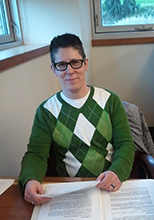
Dr. Jarvis Brownlie
Dr. Jarvis Brownlie is a professor in the Department of History at the University of Manitoba in Winnipeg, Manitoba, Canada.
He came to the Transgender Archives to start amassing information and materials relating to the history of trans rights in Canada.
My experience was extremely positive. The collection itself is remarkably extensive for a relatively new archives….The staff are accessible, very helpful, and knowledgeable and … the archives easy to use…. the records are all on site and can be retrieved in short order (this is not the case for all archival institutions). Finally, the setting is beautiful, light-filled, and comfortable.
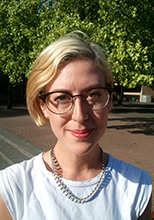
Lauren Fried
Lauren Fried is an AHRC-funded CDA PhD candidate at the Victoria and Albert Museum and Royal College of Art, London, UK. She came to the Transgender Archives to look at trans performance practices in British pop and performance in the later half of the twentieth century, with a specific interest in how trans identities are situated in archives and museum collections both in the UK and in other areas abroad.
I just wanted to say thank you for allowing me to have such a great research trip. I couldn’t have asked for a better time there – you were all so friendly, helpful, and knowledgeable, and supported me completely during my stay.
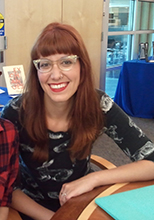
Melina Alice Moore
Melina Moore is a PhD candidate in English at the Graduate Center of the City University of New York and a graduate teaching fellow at Brooklyn College in New York, NY, USA.
She came to the Transgender Archives to research representations of trans people in mid-20th-century popular culture, especially pulp novels. She also spent time looking at Transvestia to broader her understanding of the way trans and gender nonconforming people wrote about their experiences and created community in the 1960s.
I had a wonderful experience at the archives; it was my first archival visit of my graduate career, and it was an honor to spend time with you, your staff, and the other researchers who were present during my visit. The wealth of material is so impressive and moving, and I look forward to returning.

Julie Murphy
Julie Murphy is the director of Library and Information Services at the Pacific Institute for Research and Evaluation in Oakland CA, USA. She visited the Transgender Archives because she had a personal interest in seeing the collection, both as a librarian and a queer person.
After her behind-the-scenes tour she called the Archives “Wonderful!”
The Archives are a resource that I recommend to friends and activists here in the San Francisco Bay Area.
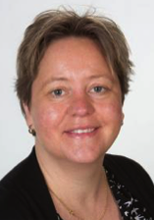
Machteld Vonk
Machteld Vonk is an assistant professor of Family and Child Law at the Institute for Private Law, Department of Child Law, at Leiden University Law School, The Netherlands.Dr. Vonk is a legal scholar doing research in the area of families and gender: multi-parent families, same-sex families, families through surrogacy and gender in family law. Her starting point in all these issues is the position of children and thus she is very interested in the rights of transgender children.
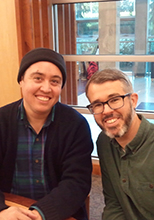
Chris Vargas and Greg Youmans
Chris E. Vargas is an artist and assistant professor of Art at Western Washington University in Bellingham, WA. Greg Youmans (right) is an assistant professor of English and Film Studies at Western Washington University in Bellingham, WA.
Chris Vargas is working on a project called "Transgender Hirstory in 99 Objects," which is part of a project called the Museum of Transgender Hirstory & Art. Greg Youmans’ research focuses on U.S. queer history and politics, and in particular media activism of the 1970s. He is currently at work on a book about queer filmmaking in the San Francisco Bay Area in the 1970s.
My experience at the Transgender Archive was amazing, if a bit overwhelming. In the two days I was there I only began to scratch the surface in terms of gaining a comprehensive understanding of all that is contained there. It's such an invaluable resource to me and my creative work and I look forward to visiting again, and often.
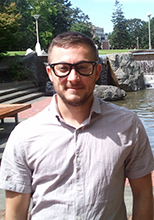
William Hebert
Trudeau Scholar William Hebert is a PhD student in Social-Cultural Anthropology at the University of Toronto developing an ethnographic research project on the over-representation and vulnerability of trans inmates in Canadian and Brazilian prisons.
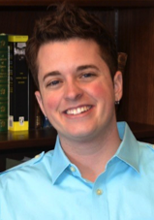
K.J. Rawson
K.J. is an Assistant Professor in the English Department at the College of the Holy Cross. His research and teaching interests include composition, rhetoric, digital media, and LGBT studies. His scholarship focuses on the rhetorical dimensions of queer and transgender archiving in both traditional and digital collections. With Eileen E. Schell, he co-edited Rhetorica in Motion: Feminist Rhetorical Methods and Methodologies (University of Pittsburgh Press, 2010) and with Aaron Devor he co-edited a special issue of TSQ on Archives and Archiving (Duke University Press, 2015). His scholarship has also appeared in Archivaria, Enculturation, Present Tense, QED, TSQ, and several edited collections.


